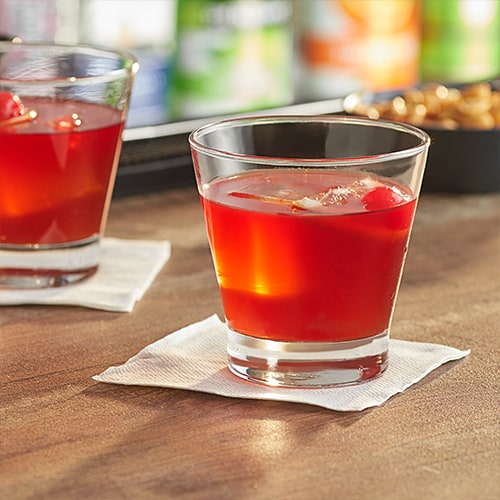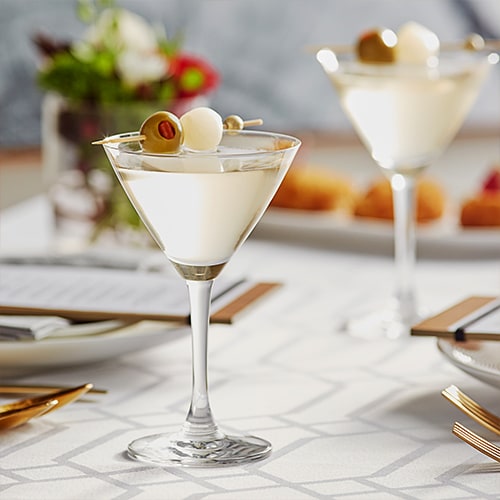From a resurgence in classic gin drinks to a slew of creative new cocktails, this popular distilled spirit is having a Renaissance moment. But what exactly is gin? At its core, gin is a neutral spirit that is distilled from natural ingredients such as wheat, barley, potatoes, or grapes. This neutral spirit serves as the base for the infusion of various botanicals. Botanicals are natural elements, typically a blend of herbs, spices, fruits, and flowers that are infused during the distillation process. Common botanicals used in gin production include coriander, citrus peels, and angelica root. While there is a lot of freedom in the framework, the one botanical that must be present in gin is juniper. If the predominant flavor isn’t juniper, the liquor cannot be classified as gin. To ensure it maintains its characteristic strength and potency, gins must contain at least 37.5% pure alcohol in the total volume of liquid (ABV). From the different types of gin to how to drink it, we’ve created a comprehensive guide to this dynamic spirit so you can make classic martinis or pair mixers with gin to create brand-new cocktail creations. Skip to the gin information that interests you: 1. Types of Gin 2. Gin Cocktails 3. What to Mix with Gin 4. Calories in Gin 5. What Is Genever? What Does Gin Taste Like? At the heart of gin's flavor profile is the distinctive taste of juniper berries. Juniper berries infuse a piney, resinous quality that sets gin apart from other spirits. While juniper berries play a central role in the taste of gin, the spirit's flavor can vary significantly depending on the other botanicals used in its production. Common botanicals found in gin include coriander, angelica root, orris root, and citrus peels, such as lemon or orange peels. In addition to these traditional botanicals, some gin producers experiment with unique ingredients such as fruits, florals, and herbs to create innovative flavor profiles. As a result, each gin offers a distinct taste experience, making it a versatile spirit that can be enjoyed on its own or in a variety of cocktails. Types of Gin There are three traditional types of gin: London dry gin, Plymouth gin, and Old Tom gin. Each offers unique flavors and characteristics. In addition to these classic types of gin, modern gins and gin liqueurs are diversifying the gin market, giving birth to new cocktails. Understanding the different types of gin can help you explore new flavor profiles. Whether you prefer the classic juniper-forward taste of London dry gin or the innovative botanical blends of modern gin, there is a gin style to suit every palate and preference. 1. London Dry Gin Despite its name, London dry gin does not necessarily need to be produced in London. What sets London dry gin apart is the method of production and the specific regulations that must be followed to meet the legal definition of this type of gin. One key requirement for a gin to be classified as London dry gin is that all botanicals must be added during the distillation process. This means that the flavors and aromas of the botanicals are extracted during the distillation, resulting in a smooth and well-balanced gin. Additionally, all botanicals used in London dry gin must be natural, without any artificial flavors or additives. It’s known for its juniper-forward flavor profile, with a focus on botanicals such as coriander, angelica, and citrus peel. Another important aspect of London dry gin production is that only water and a very small amount of sweetener can be added to the gin post-distillation. This ensures that the final product maintains the purity and integrity of the botanical flavors without any additional enhancements. London Dry Gin Flavor: Juniper forward, crisp, zesty, and complex Best Cocktails for London Dry Gin: Gin and Tonic, Dirty Martini, Negroni, Rickey 2. Plymouth Gin Known for being slightly sweeter than London dry gins, Plymouth gin has a subtler juniper flavor that sets it apart. What distinguishes Plymouth gin further is its emphasis on 'root' botanicals such as licorice and orris. To be considered authentic Plymouth gin, the spirit must be produced in Plymouth, England. While there used to be several gin distilleries in Plymouth, the only one remaining is the historic Black Friars Distillery which dates back to 1431 when it was established as a monastery of the Dominican Order. The rich history and heritage of the Black Friars Distillery add to the allure of Plymouth gin, making it a sought-after choice among gin enthusiasts and mixologists alike. The Black Friars Distillery offers a range of gins, including their original Plymouth gin and navy strength gin. Each variation showcases the craftsmanship and attention to detail that has made Plymouth gin a beloved choice for discerning consumers. Plymouth Gin Flavor: Cardamon, coriander, vanilla, citrus, and juniper Best Cocktails for Plymouth Gin: Marguerite, Martini, French 75, Gimlet 3. Old Tom Gin Old Tom gin is a unique and historical style of gin that offers a sweeter profile compared to Plymouth or London dry gins. This particular gin variety bridges the gap between modern styles of gin and Genever, a predecessor to gin. Old Tom gin was highly popular in the 18th century when some producers added large amounts of honey or sugar to mask the poor flavor quality of their gin. For this reason, Old Tom gin got a bad reputation and saw a decline in the 20th century, only to make a resurgence in recent years. One defining characteristic of Old Tom gin is its sweetness, which sets it apart from other gin styles. While it must include juniper as a key ingredient, there are no strict rules regarding Old Tom’s other ingredients, aging process, or base alcohol. Unlike other styles of gin that use a neutral spirit, Old Tom gin is often barrel-aged and crafted in malty styles; many liken it to juniper-infused whiskey. Old Tom gins are favored by bartenders looking to craft sweeter gin cocktails or create a unique twist on traditionally whiskey-based drinks like a Manhattan cocktail. Old Tom Gin Flavor: Sweet, smooth, subtle juniper flavor Best Cocktails for Old Tom Gin: Bees Knees, Tom Collins, the Martinez, Gimlet 4. Navy Strength Gin Navy strength gin is a term that refers to high-strength gin with an ABV of 57% or more. The origins of this term can be traced back to the 18th century when the British Royal Navy issued rations of gin to officers and rum to sailors to consume during their long sea voyages. These spirits were stored in wooden barrels below the deck alongside the gunpowder. To ensure that the gunpowder stored on board would still ignite even if the gin leaked into the barrel by accident, the Navy set a standard for the alcohol content of the spirits to be "100% proof," which translates to 57.1% ABV in modern terms. The tradition of navy strength gin continues to this day, with distillers producing gin that meets or exceeds the 57% ABV threshold. This higher alcohol content adds a bold and intense flavor profile to the spirit, making it a popular choice for cocktails that require a strong and distinctive gin base. Navy Strength Gin Flavor: Strong, warming, juniper, and other varying botanicals Best Cocktails for Navy Strength Gin: Admiral Martini, Contessa, Pink Gin, Sea Breeze Cocktail 5. Modern Gin Modern gin is a category that breaks away from traditional definitions, encompassing anything that doesn’t neatly fit into other outlined categories. This flexibility gives distillers a wide range of creative freedom, allowing them to experiment and innovate in ways that may not be possible with more traditional gin styles. Modern gin emphasizes a diverse range of botanicals beyond just juniper, the signature ingredient of gin. They often feature prominent floral, citrus, herbal, or spiced notes, creating a more complex flavor profile that sets them apart from their classic counterparts. By focusing on unique botanical combinations, modern gin offers a refreshing and exciting alternative for those looking to explore new and innovative spirits. While there are no quality guarantees with modern gins, this category is where distillers are pushing the boundaries of what gin can be. Modern Gin Flavor: Varies widely by the producer, but will always feature juniper Best Cocktails for Modern Gin: Good Witch (rose bitters, grenadine, lemon juice, prosecco, and gin) and other craft cocktails 6. Gin Liqueur Unlike traditional gin, gin liqueur does not have juniper as its primary flavor. While juniper is the dominant botanical in gin, gin liqueurs often feature a variety of other botanicals and flavorings that contribute to their unique taste profiles. This diversity of flavors allows gin liqueur to offer a wide range of taste experiences, from fruity and floral to spicy and herbal. A key characteristic of gin liqueur is its high concentration of added sweeteners, giving it a much sweeter and syrupier taste and texture compared to regular gin. This saccharine quality makes gin liqueur a popular choice for crafting cocktails that require a touch of sweetness and flavor saturation. In terms of ABV, gin liqueur typically falls in the range of 20-30%, making it a milder option compared to standard gin. This lower ABV level contributes to its smoother finish. Gin Liqueur Flavor: Varies widely by the producer, strong botanical influences, light juniper flavor Best Cocktails for Modern Gin: Gin Punch, Gin Basil Smash, Low ABV cocktails Gin Cocktails When it comes to enjoying gin, there are several ways to savor its unique flavors. Whether you prefer a classic gin and tonic or a more elaborate cocktail, the versatility of gin makes it a popular choice for many establishments. Here are some timeless gin cocktails: Gin and Tonic: One of the most iconic gin cocktails, the gin and tonic is a simple yet refreshing drink. To make a gin and tonic, mix gin with tonic water over ice and garnish with a slice of lime or cucumber. The effervescence of the tonic water complements the botanical notes of the gin, creating a balanced and crisp drink. Negroni: The Negroni is a bittersweet cocktail that combines gin, sweet vermouth, and Campari. To make a Negroni, mix equal parts of gin, sweet vermouth, and Campari in a glass filled with ice. Stir well and garnish with an orange twist. The complex flavors of the Negroni make it a favorite among cocktail enthusiasts. Martini: The martini is a timeless cocktail that showcases the bold flavor of gin. To make a classic gin martini, combine gin with dry vermouth in a mixing glass filled with ice. Stir or shake the mixture (depending on your preference) and strain it into a chilled martini glass. Garnish with a twist of lemon or an olive for a sophisticated touch. Bees Knees: This Prohibition-era drink combines the floral notes of gin with the sweetness of honey and the tartness of lemon, creating a well-balanced and refreshing cocktail. To make a Bees Knees, simply mix gin, fresh lemon juice, and your favorite type of honey syrup in a shaker with ice, then strain into a chilled glass. Garnish with a lemon twist for an added touch of elegance. Gin Fizz: The Gin Fizz is a fizzy and citrusy cocktail that is perfect for brunch or a warm summer day. To make a Gin Fizz, shake gin, lemon juice, simple syrup, and egg white (optional) to combine. Strain the mixture into a glass and top it off with club soda. The egg white adds a creamy texture to the cocktail, while the club soda gives it a refreshing effervescence. What to Mix with Gin If you want to create your unique gin cocktail, you’re in luck! Gin is a versatile spirit that pairs well with a variety of mixers, allowing bartenders and mixologists to get creative with their cocktail creations. Whether you want to reinvent the classic gin and tonic or experiment with unique flavor combinations, there are plenty of options to choose from. Here are some popular mixers to consider when crafting gin-based drinks: Tonic Water: Perhaps the most classic mixer for gin, tonic water is a carbonated beverage that adds a refreshing and slightly bitter flavor to the spirit. The combination of gin and tonic water is the foundation of the iconic gin and tonic cocktail, a timeless favorite among gin enthusiasts. Soda Water: For a lighter and more subtle mixer, soda water is a great option. It adds effervescence to the drink without overpowering the delicate botanical notes of the gin. Soda water is often used in gin spritzers or as a base for fruity gin cocktails. Citrus Juices: Freshly squeezed citrus juices such as lemon, lime, and grapefruit can enhance the bright and zesty characteristics of gin. These juices add a refreshing acidity to gin cocktails and are commonly used in classics like the gimlet or the Tom Collins. Learn how to make super juice to get more out of your citrus fruits for cocktailing. Herbal Liqueurs: Herbal liqueurs like vermouth, Chartreuse, or elderflower liqueur can complement the botanical flavors of gin while adding complexity to the drink. These liqueurs can be used in small amounts to create sophisticated and well-balanced cocktails. Bitters: Made from herbs, spices, and botanicals, bitters are concentrated flavorings that can enhance the complexity of gin-based cocktails. A few dashes of aromatic or citrus bitters can add character to a gin drink, making it more interesting and flavorful. Fruit Juices: Fruit juices such as cranberry, pomegranate, or pineapple can add a touch of sweetness and fruity notes to gin cocktails. These juices can be used to create tropical-inspired drinks or to balance out the herbal and floral flavors of gin. Ginger Beer: Spicy and slightly sweet, ginger beer is a popular mixer for gin that adds a kick of flavor to the drink. The combination of gin and ginger beer is commonly seen in cocktails like the Moscow Mule or the Gin Buck, where the bold flavors of ginger complement the botanicals of the gin. How Many Calories Are in Gin? A 1.5 fluid-ounce shot of gin is around 97 calories. Compared to cocktails that contain sugary mixers and add-ins, gin and tonics can be a lower-calorie and more healthful alternative. Gin’s calorie content is comparable to vodka, rum, and tequila. In contrast, a shot of whiskey contains 105 calories per shot. While these calorie counts may vary slightly depending on the proof and brand of the spirit, it’s important to be mindful of your alcohol consumption if you’re trying to maintain a healthy diet. Remember to drink responsibly and in moderation to maintain a balanced lifestyle. What Is Genever? Genever, pronounced juh-NEE-ver, is a traditional Dutch and Belgian liquor that is often considered the precursor to modern gin. The production of genever begins with the creation of malt wine, a blend of malted barley, corn, and rye that undergoes fermentation and distillation. The malt wine is then re-distilled in combination with juniper berries and other botanicals into genever. This process imparts genever with its characteristic juniper flavor (genever is Dutch for "juniper"), along with a complex blend of spices and herbs that contribute to its unique taste profile. Genever is typically aged in oak barrels, which adds depth to the spirit. It can only be made in Holland or Belgium and has strict regulations governing its production. Its flavor is often described as a hybrid between a whiskey spirit and a gin spirit, creating a unique taste experience that sets it apart from other liquors. Genever is not a substitute for gin in recipes. The history of genever dates to the 16th century when it was first distilled by Dutch chemist and alchemist Sylvius de Bouve. Originally used for medicinal purposes, genever gained popularity as a recreational drink. In 1689, the Dutch Protestant Prince William of Orange and his wife Mary ascended to the throne as co-rulers of England, Scotland, and Ireland. This period coincided with the Thirty Years War with France, during which drinking brandy imported from France was outlawed and local distillation was encouraged. English soldiers who fought alongside the Dutch in their war of independence from Spain observed the Dutch soldiers consuming genever to bolster their courage. With the prohibition on French brandy in place, William and Mary inadvertently catalyzed the unregulated distillation and widespread distribution of this juniper-infused liquid from their native land. On English soil, genever eventually evolved into what we now know as gin. With its rich history, diverse flavor profiles, and endless possibilities for experimentation, gin is a must-have spirit for any commercial establishment looking to elevate its beverage offerings. When choosing a gin, consider factors such as the distillation process, botanicals used, and the overall flavor profile. Whether you opt for a London dry gin, Old Tom gin, or a modern craft gin, there are options to suit every taste and style of cocktail-making. In addition to cocktails, gin can also be used in cooking and baking to add unexpected flavor to dishes. From gin-infused sauces to gin-flavored desserts, the possibilities are endless when it comes to incorporating this versatile spirit into your culinary creations.






